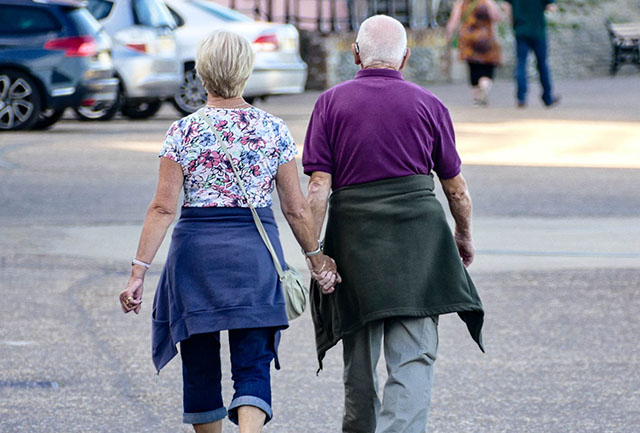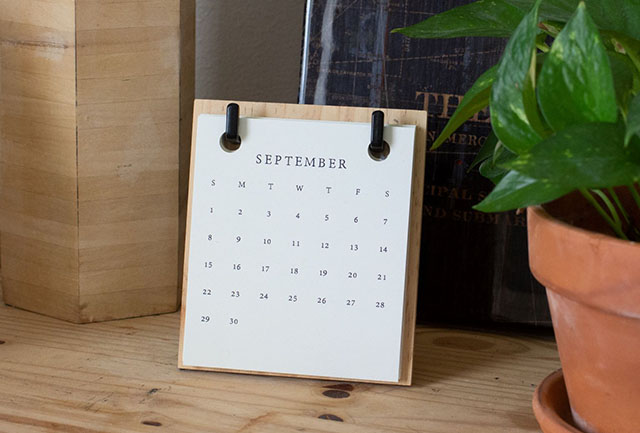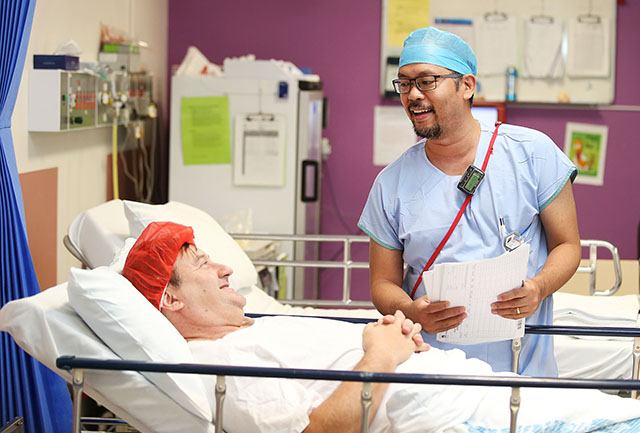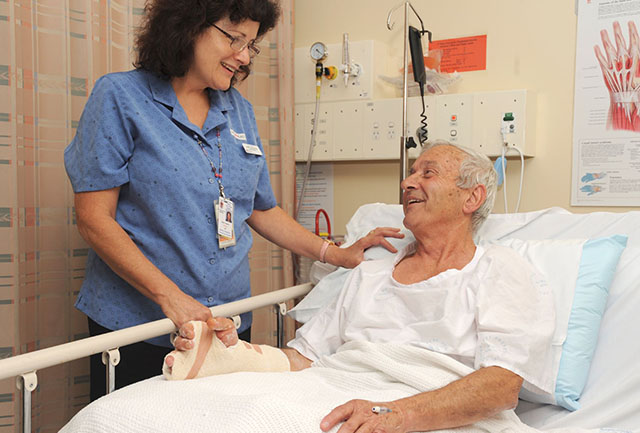This is for POWH Surgery Services

Murnaghan Urology Centre
How we can help you
We offer a range of urology medical and surgical services to people in hospital and those living in the community. Urology diagnoses and treats problems with your kidneys, adrenal glands, ureters, bladder, urethra, and male reproductive organs like the prostate, testes, and penis. We have specialised doctors and nurses and work with a range of other health professionals to help you.
Opening hours:
7.00 am - 6.30 pm Monday to Friday
Monday - Our centre provides services to children from Sydney Children's Hospital
Tuesday to Friday - Our centre provides services to adults from Prince of Wales Hospital
Manager:
Maria Pais
How to find us:
Level 3, Clinical Sciences Building, Prince of Wales Hospital (building 8 on our campus map).
We provide a wide range of procedures to help you if you have:
Urinary tract infections (UTIs):
- Urethritis - urethral infections
- Cystitis - bladder infections
- Pyelonephritis - kidney infections
Urinary tract blockages and retention:
- Tumors in your pelvis
- Stones - these can be in any part of your urinary tract and we treat with a high powered laser.
- Narrowing of your urethra (tube that carries urine away from your bladder)
- Trauma
- Benign prostatic hyperplasia of the prostate - enlarged prostate in men
We also look at how your bladder is working through a procedure called Urodynamic Studies.
We can help you with the following services:
- Cystoscopy - we examine your bladder and urethra using instruments that have an small camera.
- Ureteroscopy - to examine and/or to treat stones in your ureter, the tube connecting the kidney to the bladder. We can also take a biopsy (small amount of tissue) to examine an area of concern in your ureter.
- Pyeloscopy - treats stones in your kidney.
- Percutaneous nephrolithotomy (PCNL) - surgical procedure to remove large kidney stones.
- Transurethral resection of prostate (TURP) - this widens your urethra for better flow of urine.
- Transurethral resection of Bladder tumor (TURBT) - is a procedure to remove tumor in your bladder.
- Botox injection - to relax you bladder and relieve the feeling of needing to pass urine constantly.
- Inserting a suprapubic catheter (SPC) - inserting a tube through your abdomen into your bladder to drain urine. This is a long-term solution for non-functioning bladders.
Other surgeries we can do:
- Circumcision- removing the foreskin of the penis due tightening.
- Vasectomy - Male sterilization.
- Orchidectomy - removal of the testes due to cancer or injury.
Our team includes:
- Specialist doctors (called Urologists), and urology nurses who perform your procedure and assess, treat and manage your care.
- Anaesthetists and anaesthetic nurses will administer your anaesthesia.
- Administration staff will assist with all levels of administration enquiries before and after your procedure.
Our Urologists are:
| Name | Specialty and title |
| Dr Andrew Richards | Urology. Department head. |
| Dr Alistair Cameron-Strange | Urology |
| Dr Tom Jarvis | Urology |
| Dr Richard Savdie | Urology |
| Dr Ranjan Arianayagam | Urology |
We have the following clinics for those living in the community to come in and see a specialised doctor or nurse:
Urology Registrar Outpatient Clinic:
You will see a specialised urology doctor at this clinic. You need a referral from your GP to access this clinic. Our doctor will look at all referrals and schedule appointments based on the severity of the conditions.
This clinic runs on Tuesdays and Wednesdays.
Urology Continence Clinic
You will see a highly specialised clinical nurse specialist in this clinic. You need a referral from a Urologist (specialist doctor) to make an appointment. This clinic helps with:
- learning how to put your own catheter in
- bladder training
- pelvic floor exercises
- self-dilatation - inserting a tube in your urethra to stop it from narrowing
- percutaneous/ transdermal tibial nerve stimulation - helps with overactive bladder.
- Government funding including clinical support letters.
- continence advice - using pads and clamp and other aids and equipment.
This clinic runs Wednesdays to Fridays.
Nurses Urology Clinic
You will see specialised urology nurses who can help with:
- testing whether your urinary catheter can be removed
- inserting urinary catheters
- changing suprapubic catheters
- bladder scans and looking at flow of urine
- referrals to community nurses.
If you are coming to our outpatient clinics:
To attend the Urology Registrar Clinic, you will need a referral from your local doctor (GP). Once we receive your referral our doctors will schedule appointments based on how severe your condition is. Our administration staff will then contact you via letter or email with an appointment date.
If we have your current mobile phone number, you will receive a reminder via text messages 5 and 3 days before to your clinic appointment. Please confirm your appointment by replying to this message.
If you need to reschedule or cancel your appointment, please call our department on 02 9382 2090. Rescheduling may mean lengthy delays.
If you need assistance before your next clinic appointment, see your GP or if it is an emergency, please attend your nearest hospital emergency department.
If you are coming to our centre for a procedure:
Our hospital admissions office will contact you directly to offer you a date and time for your procedure.
If you need to reschedule or cancel your appointment, please call our admissions office on
02 9382 1455.
For our outpatient clinic, please bring:
- Medicare card/private health insurance details if you are privately insured.
- List of current medications.
- Any recent test results or scans.
- A support person.
For a procedure, please bring:
- Medicare card
- List of medications
- Recent test results, X-rays and scans
Please do not bring jewellery, valuables or large amounts of money. The hospital cannot accept responsibility for loss or damage of your property.
Remove nail polish and shellac.
If your procedure involves a General Anaesthetic or sedation, you need to arrange a responsible adult to take you home afterwards and stay with you overnight. The procedure cannot go ahead if there is not a responsible adult who can do this. On admission the nurses must get a mobile/phone number to contact that person, if not, we may have to reschedule to a time that is suitable for that person to collect you after your procedure.
Please let us know if you need an interpreter before your appointment date. You can contact us telephoning the Translating and Interpreting Service (TIS) on 131 450. Tell the operator what language you speak and then ask the interpreter to set up a telephone conversation between you, an interpreter, and our service.
Murnaghan Urology Centre
How we can help you
We offer a range of urology medical and surgical services to people in hospital and those living in the community. Urology diagnoses and treats problems with your kidneys, adrenal glands, ureters, bladder, urethra, and male reproductive organs like the prostate, testes, and penis. We have specialised doctors and nurses and work with a range of other health professionals to help you.
Opening hours:
7.00 am - 6.30 pm Monday to Friday
Monday - Our centre provides services to children from Sydney Children's Hospital
Tuesday to Friday - Our centre provides services to adults from Prince of Wales Hospital
Manager:
Maria Pais
How to find us:
Level 3, Clinical Sciences Building, Prince of Wales Hospital (building 8 on our campus map).
We provide a wide range of procedures to help you if you have:
Urinary tract infections (UTIs):
- Urethritis - urethral infections
- Cystitis - bladder infections
- Pyelonephritis - kidney infections
Urinary tract blockages and retention:
- Tumors in your pelvis
- Stones - these can be in any part of your urinary tract and we treat with a high powered laser.
- Narrowing of your urethra (tube that carries urine away from your bladder)
- Trauma
- Benign prostatic hyperplasia of the prostate - enlarged prostate in men
We also look at how your bladder is working through a procedure called Urodynamic Studies.
We can help you with the following services:
- Cystoscopy - we examine your bladder and urethra using instruments that have an small camera.
- Ureteroscopy - to examine and/or to treat stones in your ureter, the tube connecting the kidney to the bladder. We can also take a biopsy (small amount of tissue) to examine an area of concern in your ureter.
- Pyeloscopy - treats stones in your kidney.
- Percutaneous nephrolithotomy (PCNL) - surgical procedure to remove large kidney stones.
- Transurethral resection of prostate (TURP) - this widens your urethra for better flow of urine.
- Transurethral resection of Bladder tumor (TURBT) - is a procedure to remove tumor in your bladder.
- Botox injection - to relax you bladder and relieve the feeling of needing to pass urine constantly.
- Inserting a suprapubic catheter (SPC) - inserting a tube through your abdomen into your bladder to drain urine. This is a long-term solution for non-functioning bladders.
Other surgeries we can do:
- Circumcision- removing the foreskin of the penis due tightening.
- Vasectomy - Male sterilization.
- Orchidectomy - removal of the testes due to cancer or injury.
Our team includes:
- Specialist doctors (called Urologists), and urology nurses who perform your procedure and assess, treat and manage your care.
- Anaesthetists and anaesthetic nurses will administer your anaesthesia.
- Administration staff will assist with all levels of administration enquiries before and after your procedure.
Our Urologists are:
| Name | Specialty and title |
| Dr Andrew Richards | Urology. Department head. |
| Dr Alistair Cameron-Strange | Urology |
| Dr Tom Jarvis | Urology |
| Dr Richard Savdie | Urology |
| Dr Ranjan Arianayagam | Urology |
We have the following clinics for those living in the community to come in and see a specialised doctor or nurse:
Urology Registrar Outpatient Clinic:
You will see a specialised urology doctor at this clinic. You need a referral from your GP to access this clinic. Our doctor will look at all referrals and schedule appointments based on the severity of the conditions.
This clinic runs on Tuesdays and Wednesdays.
Urology Continence Clinic
You will see a highly specialised clinical nurse specialist in this clinic. You need a referral from a Urologist (specialist doctor) to make an appointment. This clinic helps with:
- learning how to put your own catheter in
- bladder training
- pelvic floor exercises
- self-dilatation - inserting a tube in your urethra to stop it from narrowing
- percutaneous/ transdermal tibial nerve stimulation - helps with overactive bladder.
- Government funding including clinical support letters.
- continence advice - using pads and clamp and other aids and equipment.
This clinic runs Wednesdays to Fridays.
Nurses Urology Clinic
You will see specialised urology nurses who can help with:
- testing whether your urinary catheter can be removed
- inserting urinary catheters
- changing suprapubic catheters
- bladder scans and looking at flow of urine
- referrals to community nurses.
If you are coming to our outpatient clinics:
To attend the Urology Registrar Clinic, you will need a referral from your local doctor (GP). Once we receive your referral our doctors will schedule appointments based on how severe your condition is. Our administration staff will then contact you via letter or email with an appointment date.
If we have your current mobile phone number, you will receive a reminder via text messages 5 and 3 days before to your clinic appointment. Please confirm your appointment by replying to this message.
If you need to reschedule or cancel your appointment, please call our department on 02 9382 2090. Rescheduling may mean lengthy delays.
If you need assistance before your next clinic appointment, see your GP or if it is an emergency, please attend your nearest hospital emergency department.
If you are coming to our centre for a procedure:
Our hospital admissions office will contact you directly to offer you a date and time for your procedure.
If you need to reschedule or cancel your appointment, please call our admissions office on
02 9382 1455.
For our outpatient clinic, please bring:
- Medicare card/private health insurance details if you are privately insured.
- List of current medications.
- Any recent test results or scans.
- A support person.
For a procedure, please bring:
- Medicare card
- List of medications
- Recent test results, X-rays and scans
Please do not bring jewellery, valuables or large amounts of money. The hospital cannot accept responsibility for loss or damage of your property.
Remove nail polish and shellac.
If your procedure involves a General Anaesthetic or sedation, you need to arrange a responsible adult to take you home afterwards and stay with you overnight. The procedure cannot go ahead if there is not a responsible adult who can do this. On admission the nurses must get a mobile/phone number to contact that person, if not, we may have to reschedule to a time that is suitable for that person to collect you after your procedure.
Please let us know if you need an interpreter before your appointment date. You can contact us telephoning the Translating and Interpreting Service (TIS) on 131 450. Tell the operator what language you speak and then ask the interpreter to set up a telephone conversation between you, an interpreter, and our service.
Outback Eye Service
How we can help you
Our specialist team provide care for adults and children living in rural areas who have eye problems. We provide assessment, diagnosis, management and treatment, including surgery.
We visit five rural locations: Bourke Hospital, Brewarrina Hospital, Cobar Hospital, Lightning Ridge Hospital, Walgett Hospital.
Manager
Dr Michael Hennessy
Office opening hours
Monday - Friday 8.00am - 4.30pm
Our office is located
Department of Ophthalmology, Level 2, South Wing, Edmund Blacket Building, Prince of Wales Hospital, Randwick, NSW
Our services are provided in these locations
Bourke Hospital, Brewarrina Hospital, Cobar Hospital, Lightning Ridge Hospital, Walgett Hospital.
Our services include:
- Specialist doctor (Ophthalmologist) clinic appointments for adults and children
- Cataract surgery - A cataract causes your vision to become cloudy. Cataract surgery removes the lens of your eye and, in most cases, replace it with an artificial lens so your vision is clear.
- Oculoplastics surgery - Surgical procedures around the eye socket, eyelid, tear ducts and your face. It includes reconstruction of the eye and surrounding structures, and is used to treat a range of problems, including droopy eyelids, tumours (e.g. melanomas), and blocked tear ducts.
- Optical Coherence Tomography (OCT) and retinal diagnostic testing - We use diagnostic equipment to take scans of your eye. This helps us examine the health of your eye.
- Visual Field Assessments - Measures how far your eye sees in any direction without moving and how sensitive your vision is in different parts of your eye.
You will need a completed referral form from your local general practitioner (GP) or your specialist to use our services. If you need to make an appointment, please ask your doctor to email or fax us your referral form with any blood and imaging results. Please fax referrals to: 02 9382 2690 or email: WNSWLHD-OESReferrals@health.nsw.gov.au
We will review your referral and send you a letter in the mail with your appointment details.
Usual wait times may vary. An urgent referral will be seen within 4 weeks. A non-urgent referral may be seen in up to 12 months.
If you need to change or cancel your appointment, telephone 0418 322 705 or 0419 111 687.
Please let us know if you need an interpreter. You can contact us telephoning the Translating and Interpreting Service (TIS) on 131 450. Tell the operator what language you speak and then ask the interpreter to set up a telephone conversation between you, an interpreter, and the healthcare professional you want to speak with.
Outback Eye Service
How we can help you
Our specialist team provide care for adults and children living in rural areas who have eye problems. We provide assessment, diagnosis, management and treatment, including surgery.
We visit five rural locations: Bourke Hospital, Brewarrina Hospital, Cobar Hospital, Lightning Ridge Hospital, Walgett Hospital.
Manager
Dr Michael Hennessy
Office opening hours
Monday - Friday 8.00am - 4.30pm
Our office is located
Department of Ophthalmology, Level 2, South Wing, Edmund Blacket Building, Prince of Wales Hospital, Randwick, NSW
Our services are provided in these locations
Bourke Hospital, Brewarrina Hospital, Cobar Hospital, Lightning Ridge Hospital, Walgett Hospital.
Our services include:
- Specialist doctor (Ophthalmologist) clinic appointments for adults and children
- Cataract surgery - A cataract causes your vision to become cloudy. Cataract surgery removes the lens of your eye and, in most cases, replace it with an artificial lens so your vision is clear.
- Oculoplastics surgery - Surgical procedures around the eye socket, eyelid, tear ducts and your face. It includes reconstruction of the eye and surrounding structures, and is used to treat a range of problems, including droopy eyelids, tumours (e.g. melanomas), and blocked tear ducts.
- Optical Coherence Tomography (OCT) and retinal diagnostic testing - We use diagnostic equipment to take scans of your eye. This helps us examine the health of your eye.
- Visual Field Assessments - Measures how far your eye sees in any direction without moving and how sensitive your vision is in different parts of your eye.
You will need a completed referral form from your local general practitioner (GP) or your specialist to use our services. If you need to make an appointment, please ask your doctor to email or fax us your referral form with any blood and imaging results. Please fax referrals to: 02 9382 2690 or email: WNSWLHD-OESReferrals@health.nsw.gov.au
We will review your referral and send you a letter in the mail with your appointment details.
Usual wait times may vary. An urgent referral will be seen within 4 weeks. A non-urgent referral may be seen in up to 12 months.
If you need to change or cancel your appointment, telephone 0418 322 705 or 0419 111 687.
Please let us know if you need an interpreter. You can contact us telephoning the Translating and Interpreting Service (TIS) on 131 450. Tell the operator what language you speak and then ask the interpreter to set up a telephone conversation between you, an interpreter, and the healthcare professional you want to speak with.
Kidney Transplant Services - East Coast Renal Services
How we can help you
Our service helps you if you have advanced kidney disease and need a kidney transplant. A kidney transplant is a surgery to place a healthy kidney from a living or deceased person into a person whose kidney is no longer working properly.
We perform over 50 kidney transplants a year at Prince of Wales Hospital. Before and after the procedure people are cared for by their local Hospital either St George Hospital, Wollongong Hospital, Sydney Children’s Hospital or St Vincent’s Hospital.
Our services include:
- assessing whether a transplant is a suitable treatment for you
- assessing those who want to donate a kidney
- providing education to donors and recipients and their families
- biopsy and transplant pathology
- telephone or videoconference services
- yearly follow up of transplant recipients.
Our Transplant service is one of the oldest in Australia and performed the first kidney transplant in NSW on 5 August 1965 - this was only the second successful kidney transplant in Australia.
Director of East Coast Transplant Service
Dr Karen Keung
Contact a Renal Transplant Physician
Phone: 02 9382 4473
Contact a Transplant Coordinator
Phone: 0428 133 180
Opening hours
8:00am – 4:00pm Monday to Friday
How to find us
Kidney Care Centre, Level 3, Parkes Building, Prince of Wales Hospital (Building 7 on our campus map)
Information about how to get to our Randwick campus
Our transplant team includes doctors, nurses, social workers, pharmacists and a dietician. Our team will explain what kidney transplant options are available, what is involved in a kidney transplant and can help you decide what option is best for you.
Our specialists
|
Director of East Coast Transplant Service
|
Dr Karen Keung MB BS BSc(med) PhD FRACP |
|
Transplant Physician |
Dr Mangalee Fernando MB BS PhD FRACP |
|
Transplant Physician |
Dr Grant Luxton MB BS FRACP |
|
Transplant Physician |
Dr Kenneth Yong MB BS PhD FRACP |
| Transplant Physician |
Dr Sara Stoler MBBCh, FCP(SA) MMED, Cert Neph (SA) Phys, FRACP |
Our Transplant Coordinators
|
Denise Lawrence |
Phone: 9382 4437 |
|
Hayley Pippard |
Phone: 9382 4443 |
Patients with chronic kidney disease are eligible for transplant assessment. There is a kidney transplant waiting list. Your Nephrologist will arrange for you to have many tests to see if a transplant is a suitable treatment for you.
When you get on the transplant list, you can expect to wait at least 3 – 5 years for a transplant. You will need to have regular tests and keep healthy during this time. You need to make sure we can contact you at all times.
Our doctor will call you and ask you questions. If the Doctor is happy to proceed they will ask you to go to Prince of Wales Hospital for your transplant. Most patients stay in hospital for 5 – 14 days. When you leave Hospital, you will have a schedule of regular follow up appointments which are essential to attend.
We are a teaching hospital and you may be asked to be involved in research or for a student to be present at your appointment. You have a right to say no. If you do so, this will not impact in any way on the services we will provide.
Please let us know if you need an interpreter. You can contact us telephoning the Translating and Interpreting Service (TIS) on 131 450. Tell the operator what language you speak and then ask the interpreter to set up a telephone conversation between you, an interpreter, and the healthcare professional you want to speak with.
Kidney Health Australia: https://kidney.org.au/resources/treatments-resource-library-1
Kidney Transplant Services - East Coast Renal Services
How we can help you
Our service helps you if you have advanced kidney disease and need a kidney transplant. A kidney transplant is a surgery to place a healthy kidney from a living or deceased person into a person whose kidney is no longer working properly.
We perform over 50 kidney transplants a year at Prince of Wales Hospital. Before and after the procedure people are cared for by their local Hospital either St George Hospital, Wollongong Hospital, Sydney Children’s Hospital or St Vincent’s Hospital.
Our services include:
- assessing whether a transplant is a suitable treatment for you
- assessing those who want to donate a kidney
- providing education to donors and recipients and their families
- biopsy and transplant pathology
- telephone or videoconference services
- yearly follow up of transplant recipients.
Our Transplant service is one of the oldest in Australia and performed the first kidney transplant in NSW on 5 August 1965 - this was only the second successful kidney transplant in Australia.
Director of East Coast Transplant Service
Dr Karen Keung
Contact a Renal Transplant Physician
Phone: 02 9382 4473
Contact a Transplant Coordinator
Phone: 0428 133 180
Opening hours
8:00am – 4:00pm Monday to Friday
How to find us
Kidney Care Centre, Level 3, Parkes Building, Prince of Wales Hospital (Building 7 on our campus map)
Information about how to get to our Randwick campus
Our transplant team includes doctors, nurses, social workers, pharmacists and a dietician. Our team will explain what kidney transplant options are available, what is involved in a kidney transplant and can help you decide what option is best for you.
Our specialists
|
Director of East Coast Transplant Service
|
Dr Karen Keung MB BS BSc(med) PhD FRACP |
|
Transplant Physician |
Dr Mangalee Fernando MB BS PhD FRACP |
|
Transplant Physician |
Dr Grant Luxton MB BS FRACP |
|
Transplant Physician |
Dr Kenneth Yong MB BS PhD FRACP |
| Transplant Physician |
Dr Sara Stoler MBBCh, FCP(SA) MMED, Cert Neph (SA) Phys, FRACP |
Our Transplant Coordinators
|
Denise Lawrence |
Phone: 9382 4437 |
|
Hayley Pippard |
Phone: 9382 4443 |
Patients with chronic kidney disease are eligible for transplant assessment. There is a kidney transplant waiting list. Your Nephrologist will arrange for you to have many tests to see if a transplant is a suitable treatment for you.
When you get on the transplant list, you can expect to wait at least 3 – 5 years for a transplant. You will need to have regular tests and keep healthy during this time. You need to make sure we can contact you at all times.
Our doctor will call you and ask you questions. If the Doctor is happy to proceed they will ask you to go to Prince of Wales Hospital for your transplant. Most patients stay in hospital for 5 – 14 days. When you leave Hospital, you will have a schedule of regular follow up appointments which are essential to attend.
We are a teaching hospital and you may be asked to be involved in research or for a student to be present at your appointment. You have a right to say no. If you do so, this will not impact in any way on the services we will provide.
Please let us know if you need an interpreter. You can contact us telephoning the Translating and Interpreting Service (TIS) on 131 450. Tell the operator what language you speak and then ask the interpreter to set up a telephone conversation between you, an interpreter, and the healthcare professional you want to speak with.
Kidney Health Australia: https://kidney.org.au/resources/treatments-resource-library-1
Heart Support Service
The Heart Support Service is a community-based nurse specialist team that coordinates with your GP and Cardiologist to support and manage your heart condition at home.
Who is eligible?
People who have a diagnosis of heart failure.
Patient Education
Simple steps for managing heart failure – English:
Heart Failure Action Plan:
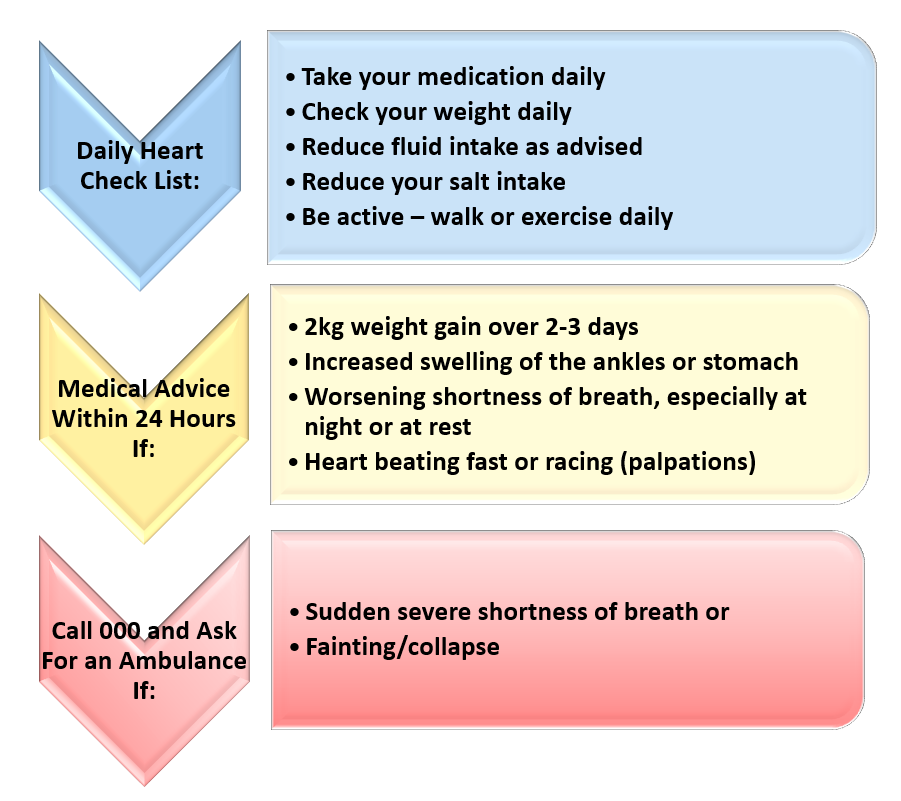
Contact Details
Heart Support Service:
- Monday - Friday (07:30 - 16:00)
- Phone: 9113-3042
- Fax: 9113-1826
Heart Failure Clinic:
Clinic times:
Clinic appointments are available on Tuesday morning (09:00 - 12:00).
Phone: 9113-3172
Fax: 9113-1826
Booking:
Your local doctor (GP) needs to fax a referral letter to Cardiology Department. Our receptionist will contact you to arrange an appointment.
Location:
The Heart Failure Clinic is located in the Cardiology Department, Level 1, Clinical Services Building, St George Hospital.
Enter via Kensington St.
-33.966662, 151.134842
Pre-Admission Clinic
Frequently Asked Questions
Why do I need to attend the Pre-Admission Clinic?
As a patient, you are required to attend Pre-Admission Clinic to ensure you are fit enough for your intended surgery. During this appointment you will see an anaesthetic doctor, surgical doctor, nurse and other health workers. It is also a good opportunity to have any of your questions answered before your admission to hospital.
How do I get to the Pre-Admission Clinic?
We are located on level 3, opposite the central lifts.
What do I bring to this appointment?
- A recent health summary from your General Practitioner (GP), including a list of current medications and over the counter medications.
- Your Medicare card
- Recent X-Rays and scans relevant to your surgery
- Copies of the most recent letter/s from your specialist (for example: cardiologists, haematologists, respiratory, renal and endocrine)
- Your most recent blood test results (within 6 months)
- Copies of your investigation results. (for example your most recent cardiac echocardiogram, stress test or coronary angiogram).
- Details of any anaesthetic complications you are aware of and any allergy testing you may have completed.
- Any other significant investigation results or issues that you feel would help us manage your surgery better.
What happens if I do not bring all the information?
If we do not have all the necessary reports and information at your appointment, it may mean the doctors will need to delay your surgery or refer you to other specialists, depending on your type of surgery and your medical conditions.
Do I need to fast for this appointment?
Fasting is not required for this appointment.
What happens if I do not attend this appointment?
Failure to attend this could result in your surgery being delayed. Please call us on 9540 7611 if you need to change your appointment date.
Who do I call if I require any further information about this appointment?
Please contact the Admission officer at 9540 7611 if you have any questions.
What if English is not my first language?
Please inform the booking officer who can organise an interpreter. We do encourage a friend or relative who can speak English to accompany you to avoid any delay.
How long does the pre-admission visit take?
Depending on your surgery, you may be here for up to 2 to 6 hours. Please remember to bring some lunch especially if you are diabetic. There are cafeteria facilities available; however it is advisable to bring your own food if walking is difficult for you.
What if I need support after surgery?
Please let us know if you will require assistance following surgery. We will be pleased to refer you to a social worker or other services.
Can I have Telehealth?
Please let us know if you have special circumstances.
This will depend on your type of surgery and your medical conditions.
How do I contact the Pre-Admission Clinic?
Office hours: Monday – Friday 8:00am to 4:30pm
Telephone: 02 9540 7611.
Office hours: Monday – Friday 8:00am to 4:30pm
-34.0371613, 151.1147459
Surgery information for patients
St George Hospital provides a multidisciplinary team of experts to guide, support and care for patients through both the elective and emergency surgical journeys.
Resources
Getting Ready for Surgery
- Hospital in the Home (HiTH) Pre-Operative Surgical Care
- "Fit for Surgery" (surgical preparation video)
- Enhanced Recovery After Surgery (videos)
- Quit smoking before surgery
- Patients' Guide to Anaesthesia
- What is an anaesthetic?
- Eating and drinking before surgery
Pain Relief Following Surgery
- Adjuvant Pain Medicines
- Patient Controlled Analgesia (PCA)
- Pain relieving medication
- Epidural Pain Relief - Patient Discharge Advice
Managing Catheters and Drains at Home
What to Expect After Surgery
- Hospital in the Home (HiTH) Post Operative Surgical Care
- What to expect after Spinal surgery
- Neck Collar: Application & Care, Sitting Position
- Neck Collar: Application & Care, Lying Position with Head-Hold
- Neck Collar: Application & Care, Lying Position without Head-Hold
- Physiotherapy after Surgery
- Safety advice following anesthesia
Accessing medical care after discharge
Walking After Surgery:
- Walking after surgery - English
- Walking after surgery - Arabic
- Walking after surgery - Bengali
- Walking after surgery - Chinese Simplified
- Walking after surgery - Chinese Traditional
- Walking after surgery - Greek
- Walking after surgery - Italian
- Walking after surgery - Macedonian
- Walking after surgery - Nepali
- Walking after surgery - Russian
- Walking after surgery - Spanish
-33.9676303, 151.1334852
Surgery, Anaesthesia and Perioperative Medicine
This information is for you and your family if you are coming to our hospital for surgery. We want to help you feel confident about your surgery.
At Prince of Wales Hospital we perform these types of surgery:
- Cardiothoracic – heart and lung surgery
- Ophthalmology – eye surgery
- Orthopaedics – bone and joint surgery
- Plastic Surgery – repair or reconstruct skin or other body tissue
- Neurosurgery – nerve, spinal cord or brain surgery
- Vascular surgery – surgery on arteries or veins
- Urology – surgery on the urinary system including bladder and kidneys
- General surgery including: upper gastrointestinal tract, colorectal, oncology surgery
- Dental, oral and maxillofacial - teeth, jaw and face surgery
- Ear, nose and throat surgery.
The information below will help you plan and prepare for your surgery. We provide information on what to expect before, during and after your surgery.
How we can help you
Perioperative Unit
Phone:
02 9382 3847
Anaesthetic Pre Evaluation Clinic
Phone:
02 9382 3865

